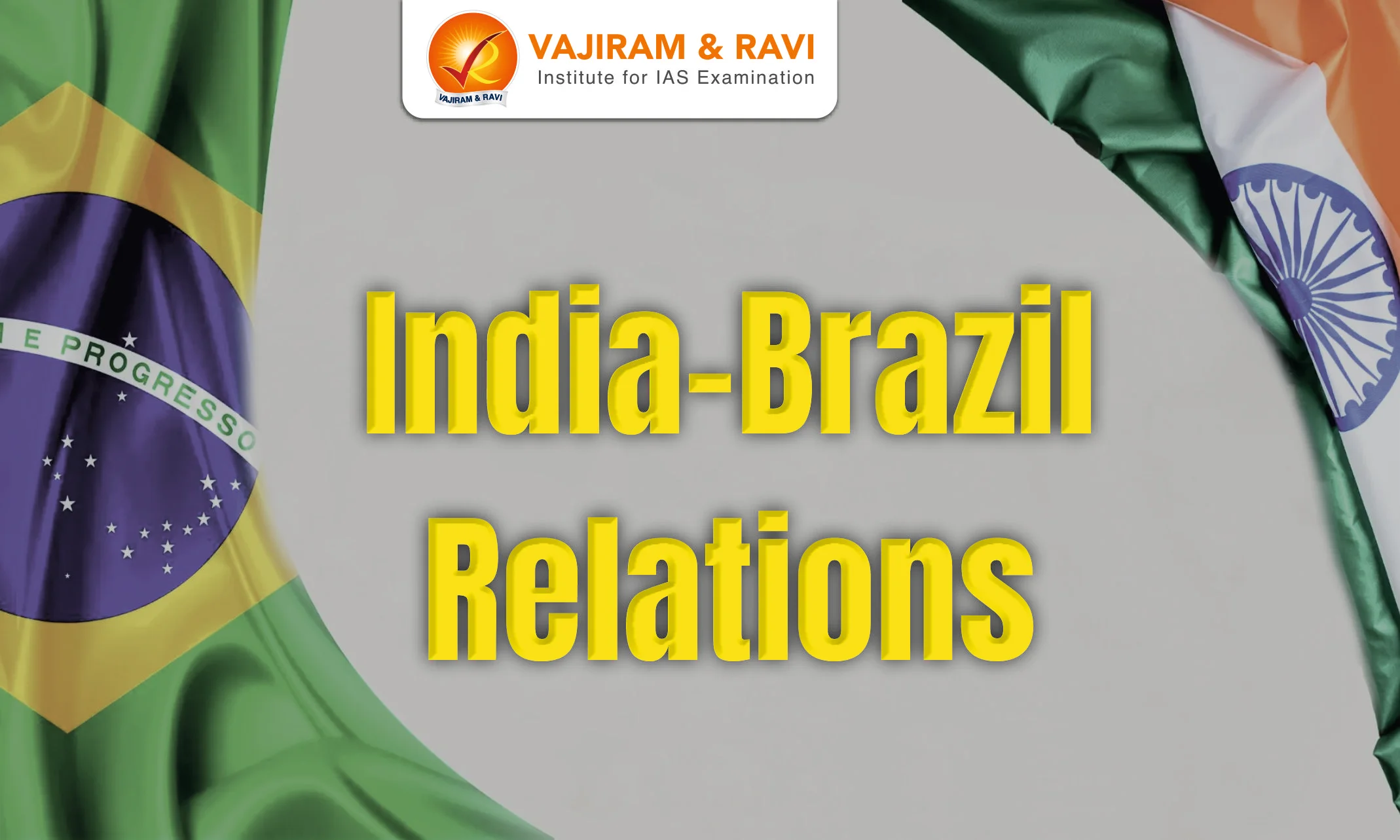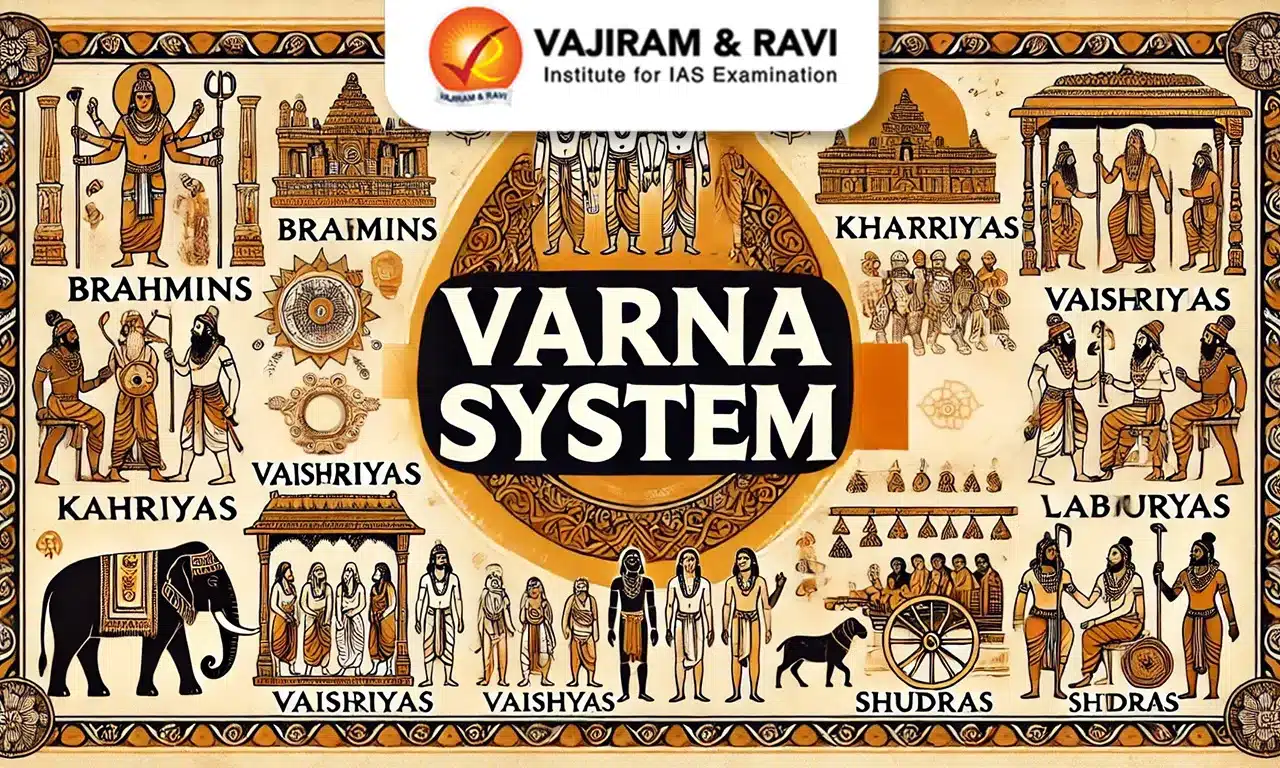What is the nature of the relationship between India and Brazil?
India and Brazil are celebrating 75 years of diplomatic relations in 2023. In recent years, the two countries have elevated their relationship based on a common global vision, commitment to development, and shared democratic values.
- Diplomatic relations were established in 1948, with both countries opening embassies in the same year.
- Both share a very close and multifaceted relationship both at the bilateral level as well as in plurilateral fora such as BRICS, BASIC, G-20, G-4, IBSA, International Solar Alliance, as well as in the larger multilateral bodies such as the UN, WTO, UNESCO, and WIPO.
- The momentum in India-Brazil relations was further created during President Bolsonaro ́s historic visit to India in January 2020 as the Chief Guest during the Republic Day celebrations.
What is the importance of Brazil to India?
Brazil is strategically important for India due to its abundant natural resources, growing markets, and potential for collaboration in various sectors.
- Critical supplier: Brazil is a critical supplier of minerals and hydrocarbons, such as crude petroleum oil, which is essential for India’s economic growth.
- Investment destination: Brazil is the largest country in Latin America, with a large and diversified economy, which makes it an attractive destination for Indian investors and businesses.
- Partner in south-south cooperation: India and Brazil are two of the largest and most influential countries in the Global South. As countries with large populations and growing economies, India and Brazil have taken on significant roles in shaping the global political and economic landscape.
- Multilateral cooperation: Brazil and India are both members of several international organizations, such as BRICS, G20, and the WTO, and share common interests in promoting multilateralism and reforming the global governance architecture.
What are the areas of cooperation between India and Brazil?
Institutional Mechanisms
As strategic partners, India and Brazil have several Institutional mechanisms to coordinate various aspects of their bilateral relationship. This includes:
- Strategic Dialogue (NSA)
- Trade Monitoring Mechanism (TMM)
- Economic and Financial Dialogue
- Joint Defence Commission
- Joint Committee on Science & Technology
- India-Brazil Business Leaders Forum
Trade and Investment
India-Brazil trade accounts for nearly one-fourth of India-Latin America trade in the 21st century, and Indian investment in Brazil, estimated at US $6 billion in 2018 is by far the largest in the region.
- Bilateral Trade:
- India became the 5th largest trading partner of Brazil in 2021. The bilateral trade exceeded US$ 11 billion, an increase of 63% compared to 2020.
- Major Indian exports to Brazil include agrochemicals, synthetic yarns, auto components and parts, and imports include crude oil, gold, vegetable oil, sugar, and bulk mineral and ores.
- Bilateral Investments:
- A plethora of sectors have witnessed investments between India and Brazil in sectors such as automobiles, IT, mining, energy, biofuels, and footwear sectors.
- In 2018, the total Indian investment in Brazil was estimated at USD 6 billion, and the total Brazilian investment in India was estimated at USD 1 billion.
- India-MERCOSUR PTA:
- Brazil played a crucial role in the India-MERCOSUR Preferential Trade Agreement (PTA) that improves India’s access to the large South American market.
Defence & Security Cooperation
- India and Brazil signed an agreement in 2003 for cooperation in defense. Joint Defence Committee (JDC) meetings are held as an institutionalized mechanism for defense cooperation.
- India and Brazil established a strategic dialogue mechanism in 2006 to cover regional and global issues of mutual concern. This dialogue is led by NSA from the Indian side.
- An MoU on cooperation in the area of Cyber Security between CERT-In and its counterpart agency was signed during the State Visit of President Bolsonaro in January 2020.
Cooperation in Biofuels, Oil & Gas
Brazil with total crude oil reserves of 13.4 billion barrels, has the 2nd largest oil reserves in South America after Venezuela. Around 48% of Brazilian exports to India in 2020 were represented by crude petroleum oil.
- India and Brazil are already cooperating in multilateral forums such as Bio platforms. ‘National Biofuel Policy’ of India and the ‘Renova Bio’ Programme of Brazil have some common objectives related to the increase in the current blending percentage of bio-fuel with Petrol and Diesel.
- In recent times, the 1st India-Brazil Joint Working Group on Oil & Natural Gas took place in April 2021, and JWG on Bioenergy in August 2021.
Cooperation in multilateral fora
India and Brazil have a close and diverse relationship, both bilaterally and in various plurilateral fora and multilateral bodies, as follows.
- BRICS:
- As two of the largest and fastest-growing economies in the grouping, India and Brazil play a crucial role in shaping the agenda of the BRICS forum.
- The partnership between India and Brazil in BRICS is seen as a key driver of South-South cooperation and a platform for promoting greater cooperation among emerging economies.
- BASIC:
- BASIC group stands for Brazil, South Africa, India, and China, formed in 2009 before the United Nations Framework Convention on Climate Change’s (UNFCCC) Copenhagen summit.
- India and Brazil collaborate in BASIC to advocate for the interests of developing countries in the global climate change negotiations, particularly in the context of the UNFCCC and the Paris Agreement.
- IBSA:
- IBSA stands for “India, Brazil, and South Africa Dialogue Forum, which was launched in 2003 as a platform for these three democracies from three different continents to work together on common developmental challenges.
- India and Brazil collaborate with South Africa in IBSA to advance the development agenda of the Global South and to promote South-South cooperation. They also use IBSA as a forum to coordinate their positions on issues of mutual interest in other multilateral fora.
- G4:
- India and Brazil are both members of the G4 group, along with Japan and Germany, that support each other’s bids for permanent seats on the United Nations Security Council (UNSC).
- Both have been working to push for greater representation of developing countries in the Security Council and to expand the Council’s membership to reflect the realities of the 21st-century world.
Science and Technology
- Space cooperation: Both countries have been collaborating in Data sharing and satellite tracking of Indian satellites.
- Cooperation in Science and Technology (S&T): A Programme of Scientific and Technological Cooperation (PoC S&T) for the period 2020-2023 was signed during the recent State Visit of President Bolsonaro to India.
- Cooperation in agriculture, food processing, and animal husbandry: Indian cattle like Gir and Kankrej, which were exported centuries back, have been suitably modified to yield large quantities of milk in Brazil. Both sides are working on training and capacity building, including technology transfer.
Cultural relations
In Brazil, there is a lot of interest in India’s culture, religion, performing arts and philosophy
- Cultural exchanges: A Cultural Exchange Programme (CEP) for the years 2020-2024 was signed during the State Visit of President Bolsonaro to India in January 2020.
- AYUSH: Brazil has a strong community of Yoga and Ayurveda practitioners. The Brazilian Association of Ayurveda (ABRA) is a non-profit association with offices in 9 states of Brazil and members all over Brazil.
What are the challenges in the bilateral relationship between India and Brazil?
The India-Brazil relationship faces various challenges. This includes
- Trade competition: Both India and Brazil are major exporters of agricultural products such as sugar and meat, which can create competition and trade friction between the two countries.
- Sugarcane subsidy: Brazil’s complaint to the World Trade Organization about India’s subsidies to sugarcane farmers. This has led to tensions between the two countries due to Brazil’s concerns over India’s agricultural policies that could negatively impact its economic interests.
- Limited people-to-people contact: India and Brazil have a limited number of people-to-people contacts, including business, cultural, and educational exchanges.
- Role of China: Furthermore, there are concerns as China, which is Brazil’s largest trading partner, can have an impact on relations between India and Brazil.
- Differences in strategic priorities: India and Brazil are both emerging powers that seek to enhance their global influence, but their approaches to regional and global issues may differ.
How India and Brazil could steer towards a stronger partnership?
- Identify new areas of collaboration: Identifying new areas of collaboration, such as technology, health, and infrastructure, can help the two countries explore new opportunities and deepen their engagement.
- For instance, The operationalization of the Social Security Agreement (SSA) signed between Brazil and India in March 2017 could allow investments in each other’s pension funds, enabling business processes and encouraging the flow of investment.
- Address tariff and non-tariff barriers: This involves identifying the specific trade and investment issues, conducting bilateral negotiations, and providing preferential treatment to each other’s exports.
- For instance, Indian exporters of basmati rice face challenges in accessing the Brazilian market due to stringent phytosanitary requirements.
- To address this issue, Brazil could consider reviewing its phytosanitary requirements in consultation with Indian authorities and industry stakeholders.
- Promote people-to-people contacts and cultural ties: Promoting tourism, organizing cultural events, facilitating educational exchanges, and encouraging mutual understanding and respect for each other’s culture.
- India’s film industry is popular in Brazil and leveraging this can be an excellent way to promote cultural ties.
- Energy cooperation: India and Brazil are both major consumers and producers of energy. According to a report by the International Energy Agency (IEA), India and Brazil are among the fastest-growing energy markets in the world.
- The two countries can further collaborate in areas such as renewable energy, green hydrogen, and energy efficiency.
Last updated on August, 2025
→ UPSC Mains Admit Card 2025 has been released on 14th August at www.upsc.gov.in.
→ UPSC Mains 2025 will be conducted on 22nd August 2025.
→ UPSC Notification 2025 was released on 22nd January 2025.
→ UPSC Calendar 2026 is released on 15th May, 2025.
→ UPSC Prelims Question Paper 2025 and Unofficial Prelims Answer Key 2025 are available now.
→ UPSC Prelims Result 2025 is out now for the CSE held on 25 May 2025.
→ The UPSC Vacancy 2025 were released 1129, out of which 979 were for UPSC CSE and remaining 150 are for UPSC IFoS.
→ UPSC Prelims 2026 will be conducted on 24th May, 2026 & UPSC Mains 2026 will be conducted on 21st August 2026.
→ The UPSC Selection Process is of 3 stages-Prelims, Mains and Interview.
→ UPSC Result 2024 is released with latest UPSC Marksheet 2024. Check Now!
→ UPSC Toppers List 2024 is released now. Shakti Dubey is UPSC AIR 1 2024 Topper.
→ Also check Best IAS Coaching in Delhi
India-Brazil Relations FAQs
Q1. What is MERCOSUR grouping?+
Q2. What is Global South?+
Tags: india-brazil relations quest















